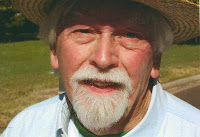I knew my life was changing when my wife advised, “You’d better tell the kids.” I thought about it and realized that to give words to my activity would necessarily change me. The assumption stemmed from a theological concept about the power of words, for in Genesis God spoke into existence the creation and then pronounced it good. Early Christian tradition called Jesus not only the Christ but also the word. I assumed words create, words value, and words move even mountains. I knew that the words I used to communicate with my grown children would have all these powers. I would be creating myself to both them and me. I would be moving myself and them into new worlds of experience and, hopefully, love. I would be testing all the values my wife and I had sought to foster in them.
I decided to describe my actions rather than call myself names. Still, to tell my daughter Desma about my activities would be to out myself not only to her but, because I assumed she would be more entertained than chagrined and not at all ashamed over what I had done, I would be known as homosexual to anyone who knew her very well. She wasn’t a gossip; she was just very open. I didn’t fault her, but I did know I’d be out in the city where she lived and where I had ministered in a congregation for nine years.
I asked my wife if she was sure about my telling them and was surprised at her answer. She didn’t want them to receive the word about my life at the same time they might have to hear that we were changing our relationship. I perceived her wisdom but wondered at her assumption that differed from mine. Still I bit the bullet and called the kids.
From years of reading queer theory, I realized that in telling them this information about myself, I would change in ways I could not yet imagine. I chose not to use categorizing words such as homosexual or bisexual, because I didn’t want to direct their ways of thinking. The main impact would be that my life and the marriage were changing. I also realized that whatever I said to them, I’d be homosexual. I knew that neither straights nor gays were comfortable with the designation bisexual. It didn’t matter that I had for many years understood and valued my bisexuality. It didn’t matter that the latest coalition of queers called itself GLBT. Yes, that B stands for bisexual, a term common in the literature of psychology, sociology, and sexology; that B represents a growing body of knowledge about humans; that B describes well the experience of thousands or even millions of human beings including me. When the story would be re-told, as I assumed it would, the B word would not be used. I would become a homosexual; I would be gay. Although that didn’t bother me at a personal level, the H word did not begin to describe my life. It was just too simple a designation. It was also one that would limit my access to work in the church.
Ironically, homosexual was more acceptable than bisexual in church work due to the possibility of being monogamous as a homosexual and the impossibility of such as a bisexual. A war of concepts and ideals seemed underway, one that would end my career. I didn’t know what I would do, what outcomes I’d find, but I did call my kids and tell them that in New Mexico I’d had two sexual affairs with men. I said their mom and I wanted them to know because we didn’t know what the future would hold. I reminded them that we loved them. My wife and I did separate. Within a year I’d left my ministerial profession and moved to Denver to live as a gay man. These choices seemed the best for everyone.
About four years later Desma heard her two boys call one another faggot. She asked them what the expression meant. Because they either didn’t know for sure or didn’t want to get into heavy trouble with their mom, they told her it meant you were strange. They’d heard it at school. She called together all four of her older children saying they needed to talk. She told them the word faggot and what it stood for: people who love and want to live with others of the same sex. They talked until she knew they understood the meaning of homosexual, gay, lesbian, and other related words. They discussed descriptive and pejorative uses of the terms. Then she said she wanted them to think for three hours, not to discuss but simply think, about people they knew that are homosexual. When she dismissed the children to go back to their play, she called her sister-in-law. “Heather,” she informed, “we’re talking about homosexuality over here. I thought you’d want to know before the kids got together again.” The families lived several blocks apart. The kids were in and out of each other’s homes. And Grandpa Phillip was coming to town in a few weeks.
When she got the kids together again, she asked them and made a list. They talked about what they knew including several homosexual people who were related to their family as friends and acquaintances. None of them suggested Grandpa Phillip. But some of the grandchildren had met Phil’s friend Tony and his male partner. They had walked his dog Shinti and had attended two gay parades with their grandpa. They had seen him greet gays and lesbians near his home. Two of them had met a transgender friend of his who bought them a cookie at a coffee shop. And since then the children and grandchildren have met Grandpa Phillip’s current partner Jim. They’ve met his mother Ruth. Most of them have stayed overnight in our home and have eaten Ruth’s homemade cookies. They have read my stories about Miss Shinti and her gay owner. They know something about their grandpa, information that will change for them as they mature. They also know they are deeply loved, even by their HomoFaggot grandpa.
Denver, 2011
About the Author
Phillip Hoyle lives in Denver and spends his time writing, painting, and socializing. In general he keeps busy with groups of writers and artists. Following thirty-two years in church work and fifteen in a therapeutic massage practice, he now focuses on creating beauty. He volunteers at The Center leading the SAGE program “Telling Your Story.”
He also blogs at artandmorebyphilhoyle.blogspot

